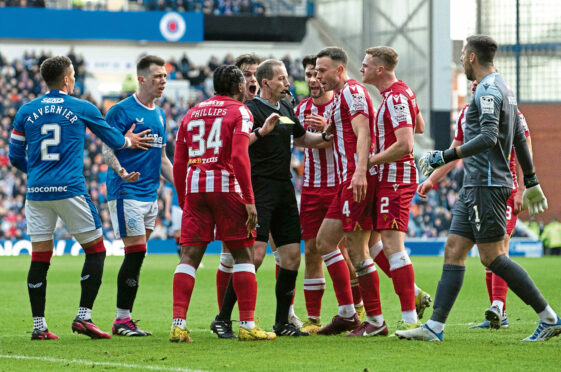
Referees and VAR have had their fair bit of criticism in the past week – and a lot of it has been merited.
Willie Collum was in charge of Rangers’ Premiership match with St Johnstone at Ibrox last weekend, and he made three controversial decisions.
The main talking point was the sending-off of Nicky Clark for a tackle on Ryan Jack.
In my opinion, it was never a red card, and should never have been given.
It was alarming that, between Willie and the VAR, Nick Walsh, they couldn’t reach the correct decision on the day.
Saints quite rightly appealed, and they won, which allowed Nicky to play against Motherwell in midweek and he contributed to their 2-0 win.
However, the damage had already been done a few days earlier as Callum Davidson’s side had to play for almost an hour at Ibrox with 10 men, and lost 2-0.
Willie also stuck to his original decision to yellow-card Ryan Jack for a late lunge on Adam Montgomery.
VAR asked him to review it at the pitchside monitor with a view to making it a red.
Willie duly went over for a look – but stuck to his original call.
It was the first time since VAR was introduced in Scotland that this has happened.
I don’t mind referees doing that as most decisions are down to opinion. And as long as the ref is being fair – and not stubborn or protecting himself – then we go with it.
There was also a controversial penalty given to Rangers when Saints defender James Brown was penalised for hand-ball.
It looked an extremely tough call on the lad.
That call left Callum furious, and he wasn’t the only manager concerned with the standard of refereeing in the past week.
Motherwell boss Stevie Hammell wanted better officiating from John Beaton in their game away to St Mirren.
And strange decisions also took place at Tannadice during Celtic’s visit when the referee, Don Robertson, failed to show Kieran Freeman a second yellow card after a hand-ball that resulted in a penalty.
Now, we don’t want to see players red-carded if it can be avoided. However, there needs to be consistency.
There can’t be one rule one week for an incident, and a different rule the next week when something very similar happens.
This season, on both sides of the border, the hand-ball rule has caused more debate than anything else.
I sometimes struggle to comprehend what it’s all about.
Surely there must be something more straightforward to help referees when these incidents occur?
The current rules on hand-ball need to change – and the sooner the better.
When I played, hand-ball was only given if it appeared deliberate. Now the rule is so much more complex and confusing.
We can all accept mistakes will happen and, as long as our match officials are acting with integrity – and without ego – we need to accept that some decisions will leave managers, players and supporters baffled.
Many calls are made on the field of play that are entirely down to opinion.
The ref might see it one way, and you might see another way. That’s why we’ve all enjoyed many arguments over a beer or a glass of wine on a Saturday night.
But as long as we believe the match officials are being honest and making decisions for the right reasons, then we must accept we won’t agree with every decision during the 90 minutes.
After all, I’m sure no referee wants to make obvious errors. That leaves their credibility and suitability for the job in question.
They will want to perform as well as they possibly can to go as far as they can in that line of work. They will want to reach the top, and rightly so.
There is no doubt that being a referee is a tough, tough job. Most people wouldn’t want to go near it!
We need them for the game to survive and thrive.
But, equally, we have every right to hold an opinion on them at the full-time whistle, whether it’s good, bad or indifferent.
As long as we all do it in a respectful and dignified manner, then debate should be encouraged.

Enjoy the convenience of having The Sunday Post delivered as a digital ePaper straight to your smartphone, tablet or computer.
Subscribe for only £5.49 a month and enjoy all the benefits of the printed paper as a digital replica.
Subscribe